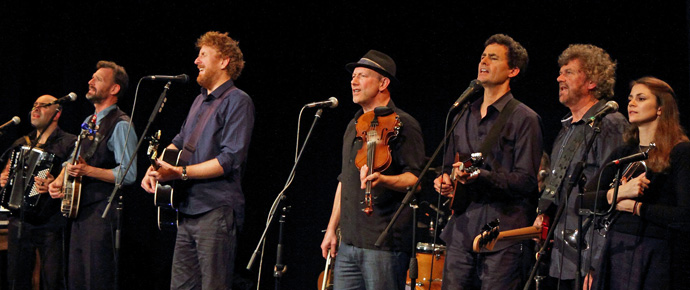
The British band Police Dog Hogan may seem to wield a rather unlikely handle for a band that ploughs a grassicana terrain, but that doesn’t deter the band from making music that spans a wide array of essential influences and seminal sounds.
For the record, they took their name from a heroic canine officer who once got cited for helping to break up a riot. It’s an odd reference but, loosely interpreted, it reflects a regimen of their own, one that emphasizes a devotion to duty.
“We can’t play fast or accurate enough to be true keepers of the flame,” James Studholme, the band’s singer and guitarist admits when asked to define the band’s sound. “We’ve become some sort of seven-headed bringer of joy as we’ve evolved our live shows using every musical tool at our disposal. We never thought people would want to see us, but it turns out, that’s what they like the most. What we try to do is use the sonic landscape of Americana, bluegrass, roots music — call it what you will — but put it lyrically into our world. Roads not highways. I draw a lot on my home county of Devon where I am now in lockdown and live when I’m not in London.”
That said, it is interesting to note the wide array of sounds that shaped the individual band members’ early interests. Studholme notes that he was initially attracted to glam rock and then punk after that. “You can get our age from that, and the fact that we grew up in the UK,” he suggests. “For me, it’s always great songwriters. Warren Zevon, Randy Newman, Steve Earle, Bruce Springsteen… now I love Jason Isbell, Avetts, Old Crow, Gil Landry, Langhorne Slim, Josh Ritter, Darlingside. I love the Transatlantic sessions live every year.”
Fiddler, mandolin player and singer Edward Bishop shares Studholme’s choices. “He brought a love of Chatham County Line to the band, which was the ethos around which we formed,” Studholme recalls. “We assumed playing acoustically round a central mic would be easy, but it wasn’t and it’s taken us the years to get any good at it… though only arguably!”
The band’s banjo, slide guitar player, and vocalist Tim Dowling hails from Connecticut. He mentions Fountains of Wayne, the Felice Brothers and the Milk Carton Kids as among his prime preferences. Singer, accordion, keyboard and harmonica player Shahen Galician cites any number of honkytonk piano playing heroes, as well as Elton John, Billy Joel, while also professing a weakness for jazz and blues. Likewise, bassist Don Bowen also shares a love for the blues.
The band is rounded out by drummer Al Hamer and vocalist, trumpet player Emily Norris.
Studholme says the band first formed in the basement of his flat in London’s Shepherds Bush. “I used to play in an alt-country band in the UK in the ’80s called The Wright Brothers. They did pretty well without being overly troubled by commercial success,” he recalls. “After a long break where the normal real life stuff had to happen — work, marriage , kids etc. — I got back to music around 2006. I stared writing songs again. These people just started showing up at my house to play. We got into Chatham County Line, particularly the album 4, and the incredibly melodic banjo playing of Chandler Holt. We were inspired by them, but we soon veered off in pursuit of the songs we were writing.”
Indeed, as evidenced by their ongoing series of releases spanning the past decade or so — Fidelis Ad Morten (2010), From The Land of Miracles (2012), Westward Ho! (2014), Wild By The Side of The Road (2016) and various EPS (their latest, Hard Times appeared late last year and a new album, titled Overground, is in the works as well) — the band puts their emphasis on their original compositions. “It’s all about the writing songs for us,” Studholme suggests. “That’s where the energy that drives us forward comes from — writing, recording and getting out to play our new songs.”
Nevertheless, Police Dog Hogan doesn’t eschew covers entirely. Studholme notes that the group will occasionally thrown some outside songs into their sets, among them, The Galway Girl (Steve Earle), If I had a Boat (Lyle Lovett), The Warden, and Wagon Wheel (Old Crow Medicine Show), and Alabama Pines (Jason Isbell).
It’s little surprise then that the band find themselves sharing certain similarities with the music that originates on the other side of the ocean, given the fact that much of what was played in the American heartland came from the British Isles to begin with.
“We kind of ping it back and forth across the pond I guess,” Studholme acknowledges. “Our general musical influences are American, but we certainly use all roots idioms in service of the song. The song tells you what it needs to be. That can go from pretty much trad folk, via bluegrass, through country rock and regional roots music. We’re fully eclectic. There’s always a bluegrass section around the mic in our shows now. It’s all about the songs.”
The band’s touring itinerary has primarily focused on the UK, but they’ve also performed in France and played a showcase in Nashville as part of the Americana Fest. Studholme adds that 2021 already promises to be a busy year as well.
While Studhome says that Britain’s affinity for bluegrass is not as prevalent as in the US (“We’re not capable of being that purist”), the country does host an array of boutique festivals where it finds its niche. So too, the ample reason why it’s attained such worldwide popularity.
“It’s so damned honest and the playing is unbelievable,” he reflects. With people like Sarah Jarosz and Chris Thile, the virtuosity crosses all boundaries. The songs are so timeless.”







